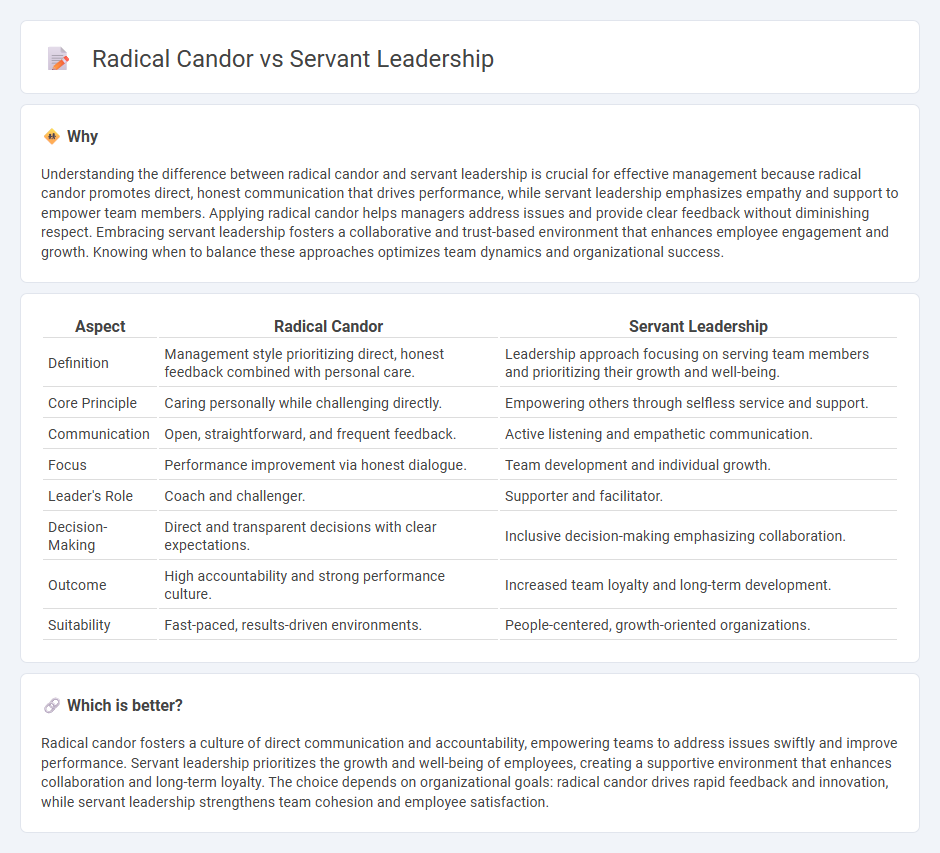
Radical Candor emphasizes direct, honest communication combined with genuine care to foster trust and improve team performance. Servant Leadership focuses on prioritizing the growth and well-being of team members, cultivating a supportive environment that empowers individuals. Explore how these distinct management styles can transform organizational culture and effectiveness.
Why it is important
Understanding the difference between radical candor and servant leadership is crucial for effective management because radical candor promotes direct, honest communication that drives performance, while servant leadership emphasizes empathy and support to empower team members. Applying radical candor helps managers address issues and provide clear feedback without diminishing respect. Embracing servant leadership fosters a collaborative and trust-based environment that enhances employee engagement and growth. Knowing when to balance these approaches optimizes team dynamics and organizational success.
Comparison Table
| Aspect | Radical Candor | Servant Leadership |
|---|---|---|
| Definition | Management style prioritizing direct, honest feedback combined with personal care. | Leadership approach focusing on serving team members and prioritizing their growth and well-being. |
| Core Principle | Caring personally while challenging directly. | Empowering others through selfless service and support. |
| Communication | Open, straightforward, and frequent feedback. | Active listening and empathetic communication. |
| Focus | Performance improvement via honest dialogue. | Team development and individual growth. |
| Leader's Role | Coach and challenger. | Supporter and facilitator. |
| Decision-Making | Direct and transparent decisions with clear expectations. | Inclusive decision-making emphasizing collaboration. |
| Outcome | High accountability and strong performance culture. | Increased team loyalty and long-term development. |
| Suitability | Fast-paced, results-driven environments. | People-centered, growth-oriented organizations. |
Which is better?
Radical candor fosters a culture of direct communication and accountability, empowering teams to address issues swiftly and improve performance. Servant leadership prioritizes the growth and well-being of employees, creating a supportive environment that enhances collaboration and long-term loyalty. The choice depends on organizational goals: radical candor drives rapid feedback and innovation, while servant leadership strengthens team cohesion and employee satisfaction.
Connection
Radical candor and servant leadership both emphasize authentic communication and prioritizing the needs of team members to foster trust and collaboration. Radical candor encourages leaders to provide honest feedback while showing genuine care, aligning closely with servant leadership's focus on empathy and support. Integrating these approaches enhances organizational culture by promoting transparency and empowering employees.
Key Terms
Empathy
Servant leadership prioritizes empathy by placing the needs and growth of team members at the forefront, fostering a supportive and trusting environment. Radical candor emphasizes empathetic communication by encouraging honest feedback delivered with care and respect to build stronger relationships and improve performance. Explore how integrating empathy in these leadership styles can transform workplace dynamics.
Transparency
Servant leadership centers on transparency by prioritizing the needs of team members, fostering open communication, and building trust through genuine support and ethical behavior. Radical candor emphasizes transparency by encouraging direct, honest feedback while maintaining empathy to create a culture of accountability and continuous improvement. Explore how these leadership styles can enhance organizational transparency and drive performance.
Empowerment
Servant leadership empowers teams by prioritizing their growth, well-being, and autonomy, fostering a culture of trust and collaboration. Radical candor emphasizes direct, honest communication balanced with genuine care, enabling individuals to confidently develop through transparent feedback. Explore how these leadership styles uniquely empower employees for lasting impact.
Source and External Links
Beyond Ego: How Servant Leadership Transforms Teams and ... - Servant leadership is a leadership style prioritizing the growth, wellbeing, and success of the team, based on principles like empathy, active listening, stewardship, and checking ego at the door to serve and empower others.
Servant leadership - Wikipedia - Servant leadership is a philosophy where the leader's main goal is to serve others, share power, put employees' needs first, and help people grow personally and organizationally, contrasting traditional leader-first models.
What is Servant Leadership? - Robert K. Greenleaf - Coined by Robert K. Greenleaf in 1970, servant leadership focuses on serving first and leading second, emphasizing care for people's growth, well-being, and communities by sharing power and prioritizing others' highest needs.
 dowidth.com
dowidth.com